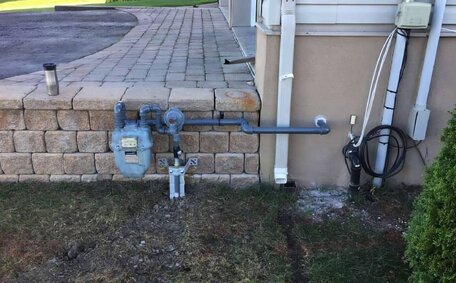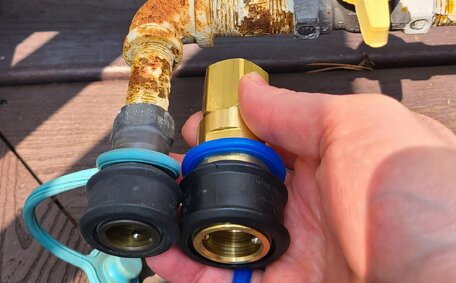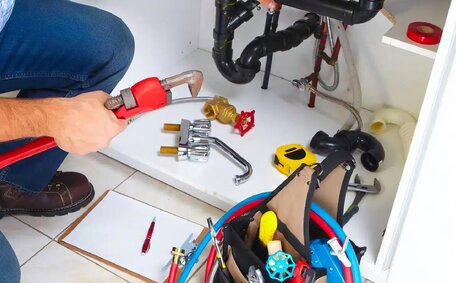Identifying Blockages in Public Restroom Drains
Indicators of blocked drains could be:
- Water draining very slowly from sinks well, toilets or urinals
- Gurgling sounds coming from drains
- Unpleasant sewer-like odours emanating from drains, which can also cause discomfort
- Toilets, sinks or urinals overflowing
- Water accumulating in drainage systems or toilets
- Constantly flushing toilets
It’s critical to act upon these indications of a potential blockage. Prompt action can do wonders to ensure your plumber addresses a minor obstruction before it becomes a larger issue.
A clogged drain can lead to your private wastewater pipes backing up, resulting in severe flooding in toilets, unsanitary conditions, and potentially closing restroom facilities. Regular maintenance and inspections are key to detecting issues before they become substantial blockages.
Common Causes of Clogged Drains in Public Restrooms
There are a few key factors that commonly lead to clogged drains in public restroom facilities:
- Hair buildup - Strands of hair, when mixed with hot water washing down your drain, can accumulate in pipes over time, forming dense blockages.
- Paper products - Items like paper towel not suited to go down drain, toilet paper, and sanitary products, not suited to go down a toilet, frequently cause jams.
- Grease and food waste - Rinsing cooking oils grease, and coffee grounds over drain creates thick, sticky obstructions.
- Improper items - Objects that should not be flushed, such as toys, diapers, and wet wipes, might find their way down toilets and snag in pipes.
Debris accumulates quickly due to the heavy daily usage of public restrooms. Your kitchen bathroom and food prep areas also contribute to the risk of clogs by carelessly putting down fats oils down sink drains. Proactive maintenance, including regular cleaning, checks on sink garbage disposals, and installing drain screens, is crucial for preventing clogs.
The improper disposal of unsuitable items is a widespread issue.
Preventing Blockages in Public Restroom Drains
There are several effective ways to help prevent blockages and maintain clear drains in public restrooms:
Implement a Regular Maintenance Schedule
A key preventative step is having maintenance staff use commercial drain cleaners to keep drains clear. Such meticulous maintenance get rid of any obstructions, ensuring that things that should go down drains do so. Our team of experienced plumbers can be engaged to make regular drain cleaning a hassle-free process.
Install Proper Signage
If you want make certain that inappropriate items are avoided, display clear signage instructing users what should never go down toilets by following these simple steps. Multi-lingual signs with clear images can effectively communicate the only things that should be flushed down toilet. Signs near sinks can inform users about the only things should and should not be poured into drain systems.
Upgrade Old or Damaged Pipes
Sydney Water recommends you find out where your oldest pipes or drain lines prone to obstructions are located, such as replacing them with less vulnerable piping to ensure an uninterrupted flow. Your local plumber can also offer advice on ensuring your relief gully and stormwater drains are up to standard to cope with causes blocked drains.
Add Drain Screens
Sink strainers and filters are effective at preventing blockages from hair, debris, and foreign objects. Screens necessitate regular cleaning but do prevent a significant chance of future clogs in drains bathroom.
Provide Adequate Waste Bins
Waste bins in stalls and near sinks help minimise drain blockages by encouraging proper disposal of waste.
For optimal drain care, consider a consultation with a professional plumber to outline preventive maintenance strategies. Proactive measures such as regular drain cleaning and infrastructure upgrades can prevent emergency blockages.
Removing Serious Blockages
There are times when, regardless of the efforts to use plunger or comparable DIY strategies, if they fail to clear your blocked drain, It’s likely time to call plumber. Here are the most efficient methods a blocked drain plumber can use to remove stubborn clogs:
Drain Snaking
Drain snaking or augering involves feeding a long cable with a cutting head through the drain to cut through blockages. The rotating blade can cut through obstructions, keeping sewer lines clear by removing the blockages. A powerful motor-driven drain snake can prevent future blockages by dislodging entrenched obstructions.
Hydro Jetting
Using water your plumber has pressurised, the jet directs powerful blasts into your pipes, effectively dislodging resistant blockages. It uses an engine and, no matter the blockage, sends high-pressure hoses feeding water at up to 4,000 PSI directly into the sewer drain lines. The force drives the hose onwards, efficiently blasting away substances that cause damage to your pipes and cause blocked passages, such as soap scum, tree roots, and solidified debris.
Manual Rodding
To avoid chemicals, plumbers might use a flexible rod to clear shower drain blockages. This works well on obstructions close to drain opening. A small hose with baking soda and hot water can also be effective in supporting the rodding process.
Calling in Professionals
Clearing serious main line blockages often requires commercial-grade hydro jetting equipment and a licensed plumber’s expertise. Licensed plumbers possess the appropriate equipment, training, and know-how to safely address blockages and surpass DIY efforts. Attempting DIY snaking in extensive piping within your home can get you in situations where you risk scratching pipes or getting equipment stuck.
Consequences of Ignoring Blocked Drains
Ignoring a blocked toilet, no matter how much water your facility needs, can lead to severe repercussions, particularly for your sewer line in high-traffic public restrooms.
Persistent Bad Odours
A blocked sewer will quickly begin to release foul smells as waste piles up and deteriorates, letting water down drain openings. The limited space and heavy traffic can lead to unsanitary and uncomfortable conditions for visitors.
Water Accumulation and Leaks
An escalating drain blockage may cause water levels to rise, leading to potential sewage overflow from sinks, toilets, and urinals. This accumulating wastewater can lead to bacterial growth and water damage within your plumbing system due to leaks.
Increased Health Risks
Raw sewage harbours pathogens like E. coli, norovirus and hepatitis A, which can proliferate inside your pipes if not addressed.
This poses infection risks, especially in facilities with high traffic like airports or stadiums. Standing water and backups caused by clogged drains drastically escalate health hazards.
Pipe Deterioration
Without prompt intervention, blockages can cause pipe damage, ruptures, or breaks, leading to wastewater spillage on your premises. Tree roots may also invade weakened drain lines.
Loss of Function
Severe obstructions can lead to complete restroom dysfunction. This essentially shuts down restrooms, with loss of amenity and huge inconvenience. Overflowing sewage also renders your sink, toilets and other facilities hazardous and unusable.
Unresolved blockages could eventually necessitate extensive repairs, such as pipe relining or replacement. Qualified plumbers who can service your door are crucial in providing early intervention to fix blocked pipes, preventing escalation into emergencies.






